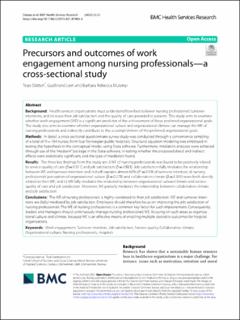| dc.contributor.author | Slåtten, Terje | |
| dc.contributor.author | Lien, Gudbrand | |
| dc.contributor.author | Mutonyi, Barbara Rebecca | |
| dc.coverage.spatial | Norway | en_US |
| dc.date.accessioned | 2022-10-27T07:30:18Z | |
| dc.date.available | 2022-10-27T07:30:18Z | |
| dc.date.created | 2022-01-04T11:02:52Z | |
| dc.date.issued | 2022 | |
| dc.identifier.citation | BMC Health Services Research. 2022, 22 (21), 1-15. | en_US |
| dc.identifier.issn | 1472-6963 | |
| dc.identifier.uri | https://hdl.handle.net/11250/3028551 | |
| dc.description.abstract | Background: Health services organizations must understand how best to lower nursing professionals' turnover intentions, and increase their job satisfaction and the quality of care provided to patients. This study aims to examine whether work engagement (WE) is a significant predictor of the achievement of these preferred organizational goals. The study also aims to examine whether organizational culture and organizational climate can manage the WE of nursing professionals and indirectly contribute to the accomplishment of the preferred organizational goals. Methods: In detail, a cross-sectional questionnaire survey study was conducted through a convenience sampling of a total of N = 164 nurses, from four Norwegian public hospitals. Structural equation modeling was employed in testing the hypothesis in the conceptual model, using Stata software. Furthermore, mediation analyses were achieved through use of the "medsem" package in the Stata software, in testing whether the proposed direct and indirect effects were statistically significant, and the type of mediation found. Results: The three key findings from this study are: i) WE of nursing professionals was found to be positively related to service quality of care (β = 0.551) and job satisfaction (β = 0.883). Job satisfaction fully mediates the relationship between WE and turnover intention and in itself explains almost 60% (R 2 = 0.59) of turnover intention; ii) nursing professionals' perception of organizational culture (β = 0.278) and collaboration climate (β = 0.331) were both directly related to their WE; and iii) WE fully mediates the relationship between organizational culture/climate and service quality of care and job satisfaction. Moreover, WE partially mediates the relationship between collaborative climate and job satisfaction. Conclusions: The WE of nursing professionals is highly correlated to their job satisfaction. WE and turnover intentions are (fully) mediated by job satisfaction. Employers should therefore focus on improving the job satisfaction of nursing professionals. The WE of nursing professionals is a common key factor for such improvement. Consequently, leaders and managers should continuously manage nursing professionals' WE, focusing on such areas as organizational culture and climate, because WE is an effective means of enabling multiple desirable outcomes for hospital organizations. | en_US |
| dc.language.iso | eng | en_US |
| dc.rights | Navngivelse 4.0 Internasjonal | * |
| dc.rights.uri | http://creativecommons.org/licenses/by/4.0/deed.no | * |
| dc.subject | Work engagement | en_US |
| dc.subject | Turnover intention | en_US |
| dc.subject | Job satisfaction | en_US |
| dc.subject | Service quality | en_US |
| dc.subject | Collaborative climate | en_US |
| dc.subject | Organizational culture | en_US |
| dc.subject | Nursing professionals | en_US |
| dc.subject | Hospitals | en_US |
| dc.title | Precursors and outcomes of work engagement among nursing professionals—a cross-sectional study | en_US |
| dc.type | Peer reviewed | en_US |
| dc.type | Journal article | en_US |
| dc.description.version | publishedVersion | en_US |
| dc.subject.nsi | VDP::Samfunnsvitenskap: 200 | en_US |
| dc.source.pagenumber | 1-15 | en_US |
| dc.source.volume | 22 | en_US |
| dc.source.journal | BMC Health Services Research | en_US |
| dc.source.issue | 21 | en_US |
| dc.identifier.doi | 10.1186/s12913-021-07405-0 | |
| dc.identifier.cristin | 1974170 | |
| cristin.ispublished | true | |
| cristin.fulltext | original | |
| cristin.qualitycode | 2 | |

